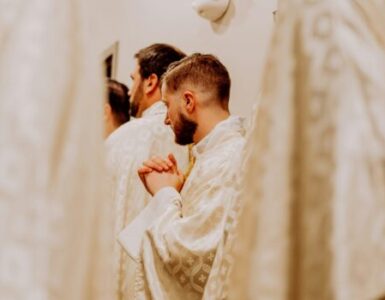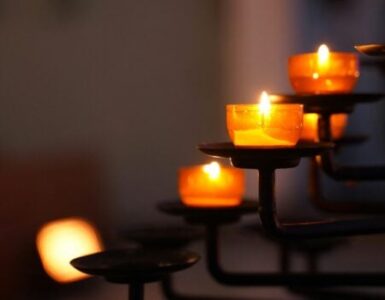There’s a band of three contemporary poets, known as Rascal Flatts, who sing a nostalgic song about the fictional town created by Andy Griffith: Mayberry, North Carolina. This hit inspires not just country music lovers, but anyone who considers the true meaning and purpose of that often trivialized day we know as Sunday. I have often felt that Sunday is the day of the week when I come up for air. The one day of the week intended for consecration to God is simply another day to get things done around the house, run errands, and prep for the work week.
I’m reluctant to categorize this struggle as simply a matter of work-life balance. This dichotomy misses the point from the start. It’s not just a matter of trying to balance two competing spheres of life. “Work vs. rest” doesn’t just misjudge the struggle, but it fails to diagnose a fundamental spiritual problem in confusing leisure and rest with laziness. Work should not be something from which we escape on the weekends, catching our breath for two days just to survive another five on the grind. When we allow our other to-do lists and interests to marginalize the more important pillar of existence proper to God’s work—contemplation and divine worship—then work becomes an idol, and we its slaves.
In the mid-20th century, German Catholic philosopher Josef Pieper wrote the essay Leisure the Basis of Culture and states, “Culture depends for its very existence on leisure, and leisure…is not possible unless it has a durable and living link with the cultus, with divine worship.” This original conception of leisure, Pieper argues, is “unrecognizable in the world of planned diligence and total labor.”
Aristotle himself reiterates in his Ethics that “we are unleisurely in order to have leisure.” To put it in modern terms, we must work to live, not live to work. Aristotle’s notion of leisure is deeply connected to the contemplative life. This is also the source of the distinction between the liberal arts and physical work, a distinction that we’re all familiar with enough to know that most physical work is unsuitable on Sundays and holidays.
But what is leisure? And why do we confuse it with laziness, and laziness with sloth?
Let’s revert back to Pieper, who sheds some light on the definition:
Leisure is not idleness, but an attitude…that fosters receptivity to both physical and spiritual realities…that allows time for the contemplation of things, including the nature of God. Leisure [is] the foundation of any culture. The modern world…has replaced it with the world of total work. This has led to much of modern restlessness and despair…and unless we recover true leisure, we will destroy our culture and ourselves.
Pieper remarks that even the root of the word leisure attests to this: leisure translates to skole in Greek and scola in Latin (or school in English). This unexpected root of leisure traces back to Jewish spirituality. Psalm 46:10 reads, “Be still and know that I am God.” This stillness, in the Septuagint, is skolasate. Grasping this concept requires a deeper understanding of the kinds of knowledge in which man participates through lived experience.
The ancients rightly understood and ordered the three basic kinds of knowledge in which man participates. First, and most importantly, is theoria (theoretical knowledge), a kind of meditation or contemplation proper to philosophy, theology, or divine worship. Secondly, is praxis, the practical knowledge proper to morality, ethics, and politics. Lastly, and the least important hierarchically, is techne, the technical knowledge proper to skill-craft and trades. We now live in a world that’s flipped this order upside down. Techne has been placed on a pedestal and is now the idol of contemporary society and culture.
Our struggle therefore is fundamentally a spiritual problem. Our restlessness is actually a type of slothfulness. Typically, we think of sloth as the idleness or laziness of the couch potato. However, St. Thomas Aquinas defines sloth as rather a kind of weariness or sorrow for spiritual good, or an aversion to the “better part” that Mary chose, for example, in the famous passage of Luke 10. In other words, when we busy ourselves to the point of neglecting the life of prayer, we are guilty of sloth.
Herein is the lie of our upside-down world: one’s value and worth to mankind is a function of one’s efficiency, productivity, and contributions to materialist progress. But our Church and our God communicate the truth: one’s value and worth is actually based on who one is rather than what one does as a functionary for industry and technology. Our dignity is therefore a function of our being.
When we look back on our first parents, Adam and Eve, we see that work itself was part of their original vocation before the Fall. According to Genesis 2:15, “the Lord God took the man and put him in the garden of Eden to till it and keep it.” Interestingly, to till has the same root word as liturgy. With Adam’s original mandate to do God’s work, to do “liturgy,” it is only after the Fall that his labor becomes a burden.
Moving forward, this theme manifests itself throughout salvation history, this constant struggle between serving God or serving man. It’s interesting that in the Hebrew, the word for serve, work, and even worship is the same thing: avodah. And so, in Genesis 2:15, God calls Adam to avodah, to an integrated life of work, service, and worship. Adam is the first priest in God’s cosmic temple, in which He rests on the seventh day. But after the Fall, his work is burdensome because he has abandoned the service of God for the service of himself.
In a previous job, I spent almost four years working about 60 hours each week in the office. It wasn’t long before I became so exhausted that when I’d come home in the evenings, I would fall asleep while sitting on the floor trying to play with my two-year-old son. In addition to this were the distractions that came with having two smartphones: a personal phone and a work phone. The constant distraction became so bad that even if my phones weren’t in my pocket or going off, I would reach for my pocket because it subconsciously felt like I was receiving a call, text, or email. It was like I had this addictive itch to constantly check my phones.
Today, Pieper’s “world of total work” has become a “world of total distraction.” We’ve accelerated into a digital age at warp speed. Our smart devices have crept their way into every facet of life, and now our phones can do almost everything for us: news, GPS, texting, videos, emails, and so much more. Instead of prayer without ceasing, we have ceaseless distractions. As the Psalmist sings, “Oh Jerusalem, if I forget you…let my soul whither” into an endless and restless distractedness. We’ve enslaved theoria to techne and praxis, and now even endless entertainment.
Our smart devices offer us a kind of gnostic way of being. Physically present, but mentally and spiritually absent, we plug in to “connect.” We indulge in the escape of the flesh that they offer. They are means by which we contradict Christ’s bold proclamation “I AM” present “with you always” even to the end of the age.
The tools of this new world appear to provide connectivity and communion, but in reality they disembody. We drift away into the distractedness of the cloud instead of the great cloud of witnesses. In this cloud, we store all things so that nothing will be lost, and we might achieve the omniscience we desire. But Christ in the Blessed Sacrament is the true storehouse of Wisdom itself, the great Mystery of Faith that provides true communion and unity, true rest and authentic leisure.
If only we would attend to Him whose Light penetrates the darkest recesses of our soul to provide spiritual refreshment, nourishment, and the peace that our blue light utterly cannot. While the architects of this “world of total distraction” desire that all men might be subscribed (or connected), God desires our salvation, and He delivers it on demand in the adoration of His Eucharistic Presence, where He fulfills our expectation for the connectivity we long for and seek. He is not limited by bandwidth or battery life.
I encourage you to seek the peace and freedom of the yoke of Christ in such a way that really distinguishes your experience of Sunday from the rest of the week. Maybe it’s disengaging from commerce on Sundays, so that you can enjoy more time for prayer and community with family and friends. Maybe it’s flipping the switch on technology and having a device-free day. Unloose and be at rest. Commune with the Presence of God in the Blessed Sacrament. Choose whom you will serve, and like Martha’s sister Mary, choose the better part.
Photo by Mark Basarab on Unsplash











